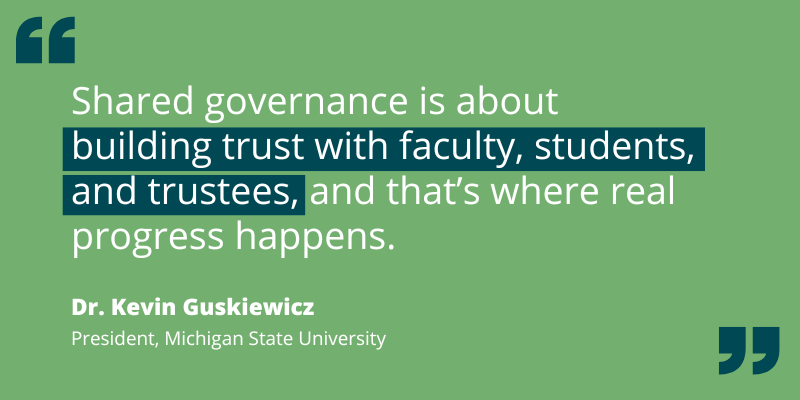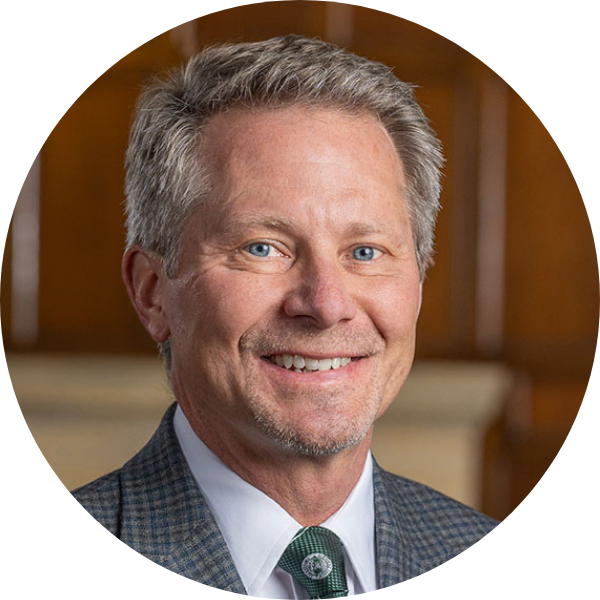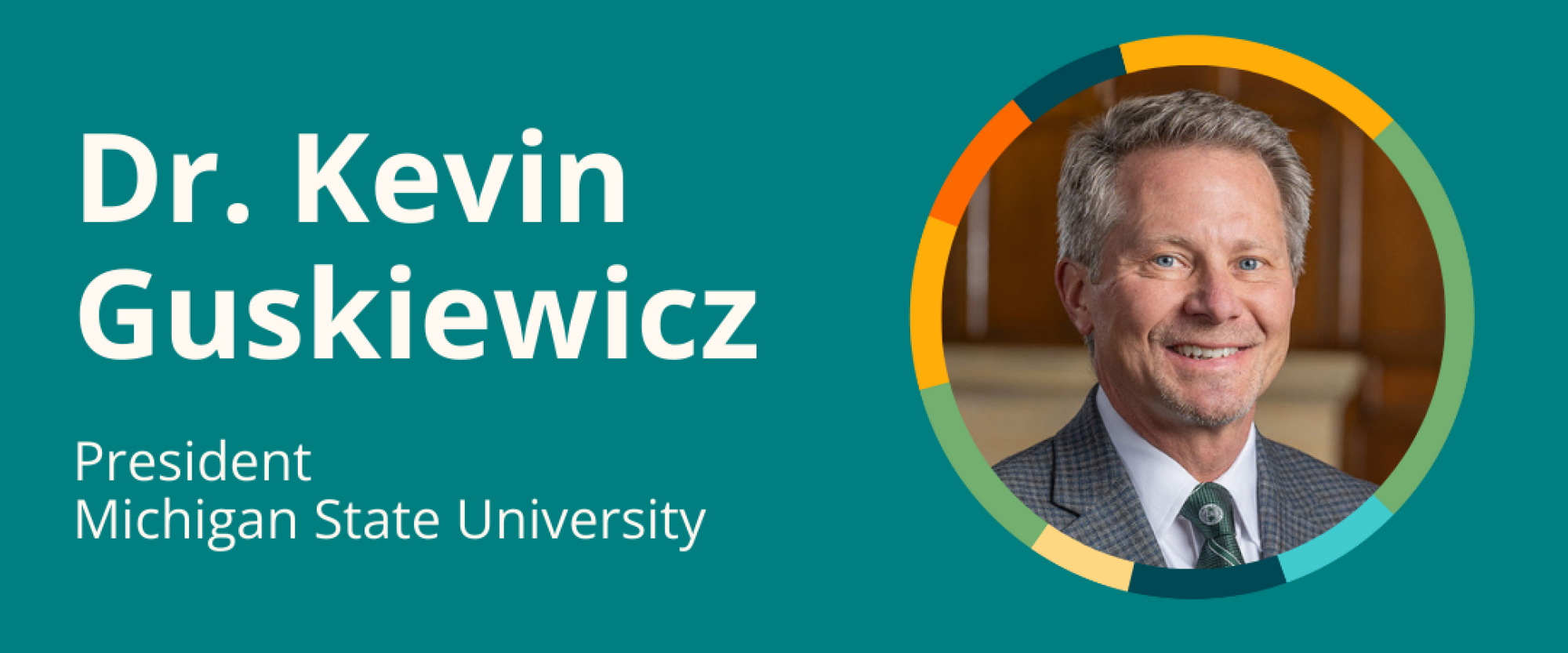As questions about the value of higher education grow louder, leaders are being called to show how universities can adapt and deliver. At Michigan State University, President Dr. Kevin Guskiewicz brings a unique lens to that challenge. A neuroscientist whose concussion research reshaped NCAA and NFL safety protocols, he now applies the same curiosity and problem-solving approach to guiding a flagship public institution.
On The Innovating Together Podcast, President Guskiewicz shared the lessons that continue to shape his leadership: the importance of asking “why,” the role of trust in building partnerships, and the discipline of staying grounded amid constant disruption. His journey highlights how curiosity, trust, and resilience are not only personal values but also essential tools for higher education leaders navigating uncertain times.
Turning Challenges into Opportunities
President Guskiewicz traces his leadership style back to his undergraduate days at West Chester University, where he double-majored in sports medicine and journalism. The experience taught him the value of curiosity and exploring opportunities beyond the classroom.
That curiosity was sharpened by a doctoral mentor who encouraged him to approach problems like a scientist: form a hypothesis, test it with the best people and methods, and then communicate the results clearly. “I’ve led using that hypothesis-driven approach as a dean, chancellor, and now president,” Guskiewicz explained. “The science is testing ideas with good people around you. The art is communicating decisions, defending them, and aligning others with them.”
This mindset has guided him through complex challenges. At UNC Chapel Hill, instead of backing calls to ban contact sports over concussion risks, he helped develop research-based safety protocols that were eventually adopted by the NCAA and NFL. “I love trying to solve problems and create opportunities,” he said. “Here at Michigan State, we’re finding a lot of opportunities within the challenges we face.”
Leadership Rooted in Trust
For Guskiewicz, scientific thinking is only part of leadership. What makes tough decisions stick is the ability to build trust. “It’s about building trust,” he said. “I learned how to do that through my research career and carried it into my academic leadership positions.”
That conviction traces back to his concussion research, a controversial area that at first put him at odds with the NFL. Instead of backing down, he pushed for change. Over time, his persistence built trust with Commissioner Roger Goodell and led to reforms such as altering kickoff rules, proof that research and collaboration can drive lasting change.

As an academic leader, he carries the same principle forward. He sees shared governance as a daily practice of trust-building, whether with faculty senates, student government, or trustees. “Shared governance is about building trust with faculty, students, and trustees, and that’s where real progress happens,” he explained.
He also credits the trust of others for shaping his path. When offered the interim chancellor position at UNC Chapel Hill, he turned to former Chancellor Holden Thorp for advice. Thorp encouraged him to accept, even though the timing was difficult. “‘The logical thing would be to say no,’ he told me. ‘But these are illogical times, and I think you’re the right person to do it.’” That trust gave Guskiewicz the confidence to step into a role that ultimately prepared him for the presidency at Michigan State.
Leading Through Uncertainty
University presidents rarely get to follow the plan they set at the start of the day. For Guskiewicz, resilience means staying grounded and flexible.
His approach rests on three personal priorities:
- Health: daily exercise, often running with a campus group.
- Family: keeping loved ones at the center of his schedule.
- Faith: a reminder of perspective beyond the immediate pressures.
“If you get those three priorities right—health, family, and faith—then the fourth priority, the job at hand, you’re going to knock it out of the park,” he said.
That steadiness allows him to lead through constant change, even when a day shifts from “Plan A” to “Plan F” by mid-morning. It also fuels his advocacy for higher education at the national level. In recent months, he has spent more time on Capitol Hill making the case for stronger federal–university partnerships and clear return on investment (ROI) for taxpayers and students.
“We have to be sure that public universities like ours are showing a good ROI on taxpayer dollars and for the students who attend,” Guskiewicz explained.
When College Felt “Worth It”
Regarding that return on investment (ROI), the UIA is aware that many Americans are actively wondering if college is still worth it. One way that we’re addressing this question is by asking the higher ed leaders who visit our podcast to share some distinctive experience or moment when they realized the value of their own college education.
President Guskiewicz recalled his a-ha! moment at a blue-collar summer job during his undergraduate years, watching his coworkers who’d chosen not to pursue a college degree. That was when he fully understood how he’d be happier working with his head rather than with his hands, and how completing his degree would help him achieve that. He also credited the mentors from his undergrad and postgrad days who encouraged him to stay curious, never be satisfied with himself, and keep moving upward. That spirit inspired him to pass up an opportunity as an athletic trainer for the Pittsburgh Steelers and make the pivotal decision to pursue his Ph.D. in sports medicine at University of Virginia. Years later, he was still focused on the value of curiosity when he accepted the presidency at MSU, adding:
“People ask me, ‘Where's your favorite place on campus?’ And they think I'm going to say Spartan Stadium or the Red Cedar River. But for me, it's in front of a classroom with a group of curious students.”
Note: This episode of the University Innovation Alliance’s Innovating Together Podcast originally aired on July 28, 2025. The podcast appears live on YouTube, Facebook, Twitter, and LinkedIn.
Resources Mentioned in This Episode
- Michigan State University
One of the Midwest’s largest public research universities, located in East Lansing. Kevin became MSU’s president in 2024. - UNC Chapel Hill
The University of North Carolina is the oldest U.S. public university. Kevin spent close to 30 years here, serving in various roles including researcher, professor, department chair, dean, and chancellor. - NCAA concussion protocol
Kevin’s research in neuroscience and collegiate athletics led directly to these nationally adopted student safety standards. - Is College Still Worth It? - UIA
The UIA’s CEO Bridget Burns and Ryan Craig, Managing Director of Achieve Partners, debate the future of higher education as a means of economic mobility.
Watch the Archive
Bios of Guest and Co-Hosts

Dr. Kevin M. Guskiewicz became Michigan State’s 22nd president in March 2024. A neuroscientist and long-time higher education leader, he leverages the university’s role as a talent activator. His signature initiatives include the Green and White Council, a public-private sector advisory group focused on preparing students for 21st-century global challenges and career opportunities; a scholarship program featuring financial support for experiential opportunities; and widening access to an MSU degree through programs accommodating community college transfers, Native American enrollees, and Lansing-area students. Prior to joining MSU, President Guskiewicz served as interim chancellor at the University of North Carolina Chapel Hill from 2019-24. He had previously been the dean at UNC’s College of Arts and Sciences and a department chair and Kenan Distinguished Professor in the Department of Exercise and Sport Science. He was executive director of the Center for the Study of Retired Athletes and founding director of the Matthew Gfeller Sport-Related Traumatic Brain Injury Research Center. Along with his current administrative duties, President Guskiewicz holds a professorship in the MSU College of Education’s Department of Kinesiology and maintains an active research portfolio. He is also active in Business Leaders for Michigan, Citizens Research Council, Detroit Economic Club, Detroit Regional Chamber, Downtown Detroit Partnership, Grand Action 2.0, and the Council for Competitiveness. In 2011, he received the MacArthur Fellowship for his innovations in diagnosis, treatment, and prevention of sport-related concussions, a body of research that has influenced collegiate and professional football safety guidelines, and he has published over 200 peer-reviewed papers. In 2013, Time magazine named him a Game Changer, one of 18 “innovators and problem-solvers that are inspiring change in America.” A 2020 National Athletic Trainers’ Association Hall of Fame inductee, President Guskiewicz earned a B.S. in athletic training from West Chester University, a M.S. in exercise physiology/athletic training from the University of Pittsburgh, and a Ph.D. in sports medicine from the University of Virginia. Born and raised in Latrobe, Pennsylvania, he and his wife Amy have four children.

Co-Host: Bridget Burns, Executive Director, University Innovation Alliance
Dr. Bridget Burns is the founding Executive Director of the University Innovation Alliance (UIA). For the past decade, she has advised university presidents, system chancellors, and state and federal policy leaders on strategies to expand access to higher education, address costs, and promote completion for students of all backgrounds. The UIA was developed during Bridget’s tenure as an American Council on Education (ACE) Fellowship at Arizona State University. She held multiple roles within the Oregon University System, including serving as Chief of Staff and Senior Policy Advisor, where she won the national award for innovation in higher education government relations. She was a National Associate for the National Center for Public Policy and Higher Education, and has served on several statewide governing boards including ones governing higher education institutions, financial aid policy, and policy areas impacting children and families.

Co-Host: Doug Lederman, Editor and Co-Founder, Inside Higher Ed
Doug Lederman is editor and co-founder of Inside Higher Ed. With Scott Jaschik, he leads the site's editorial operations, overseeing news content, opinion pieces, career advice, blogs and other features. Doug speaks widely about higher education, including on C-Span and National Public Radio and at meetings and on campuses around the country. His work has appeared in The New York Times and USA Today, among other publications. Doug was managing editor of The Chronicle of Higher Education from 1999 to 2003, after working at The Chronicle since 1986 in a variety of roles. He has won three National Awards for Education Reporting from the Education Writers Association, including one for a 2009 series of Inside Higher Ed articles on college rankings. He began his career as a news clerk at The New York Times. He grew up in Shaker Heights, Ohio, and graduated in 1984 from Princeton University. Doug and his wife, Kate Scharff, live in Bethesda, MD.
About Innovating Together
Innovating Together is an event series that happens live on YouTube, Facebook, Twitter, and LinkedIn. It also becomes a podcast episode. Every week, we join forces with Inside Higher Ed and talk with a higher education luminary about student success innovations or a sitting college president or chancellor about how they're specifically navigating the challenges of leadership. We hope these episodes will leave you with a sense of optimism and a bit of inspiration.
Rate, Review & Subscribe
Learn why hundreds of people have rated this new podcast 5 stars! Please join others and rate and review this podcast. This helps us reach and inform more people -- like you -- to help increase the number and diversity of college graduates in the United States.
Click here, scroll to the bottom, tap to rate with five stars, and select “Write a Review.” Then be sure to let us know what you loved most about the episode! Also, if you haven’t done so already, subscribe to the podcast. We’ll be adding a bunch of bonus episodes to the feed and, if you’re not subscribed, there’s a good chance you’ll miss out.

